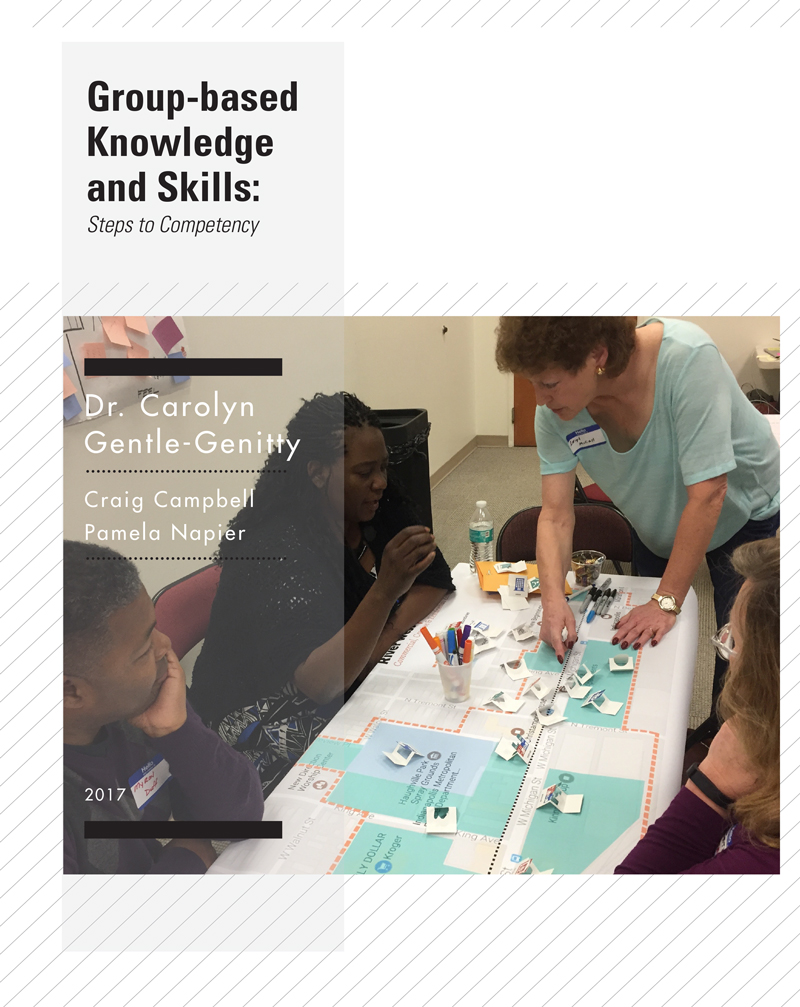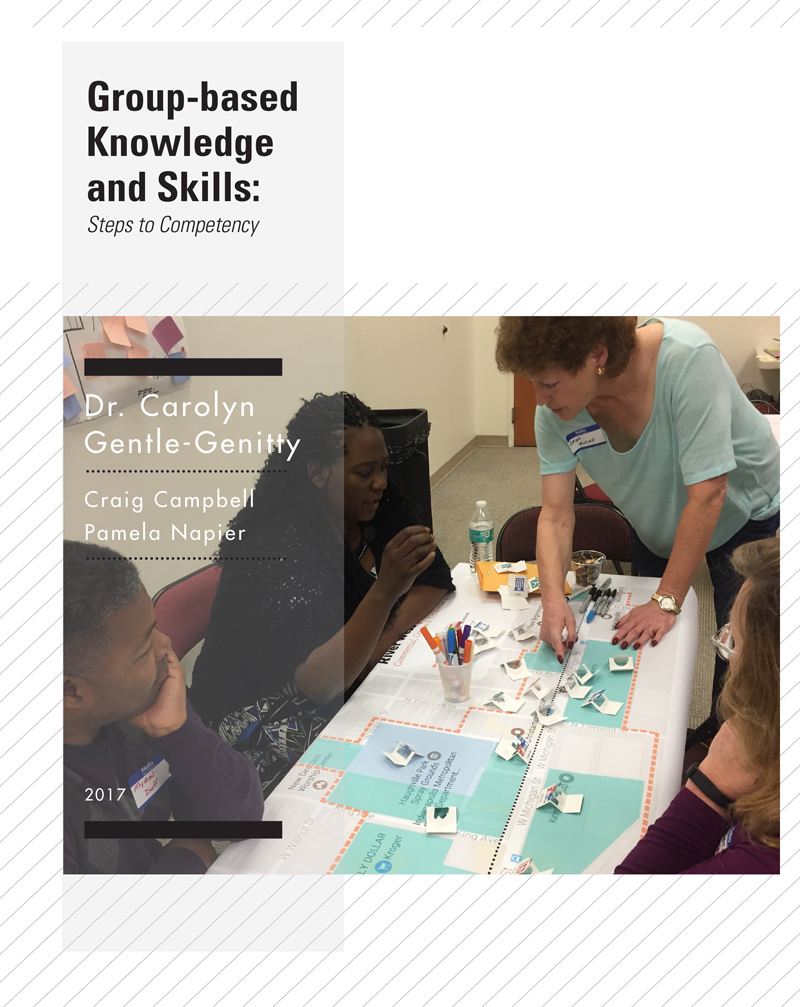Group-Based Knowledge and Skills: Steps to Competency
Author(s): Carolyn Gentle-Genitty , PAMELA C. NAPIER , CRAIG L. CAMPBELL
Edition: 1
Copyright: 2017
Pages: 201
Group-Based Knowledge and Skills is a cutting-edge textbook for its time. It recognizes the new generations (Gen-Zers and Millennials) showing up in our classrooms and offers a texts catered to their learning styles. Though astute in learning, savvy with technology, and apt at social media, Gen-zers and millennials are one of the generations limited in their exposure to formal and informal groups. This is a clear gap, which the education curriculum must fill. This 14-Chapter textbook brings together knowledge from classroom, community, and labor aligned with human design, social work, and business practices. Skill scaffolding is a hallmark of this text. The student and the instructor can pair-down skills, from each chapter, to support working with groups. Therefore, students get to know exactly what they are learning, the number of skills learned, and which skills they gained after completing the text. The book provides easy to read chapters of no more than 10 pages per chapter using Gentle-Genitty’s teaching strategy –TDPE (Teach, Demonstrate, Practice, and Evaluate). Each chapter has a short teaching component supported with examples to demonstrate the content, concluding with an opportunity to practice the content using a case scenario and an evaluation skills rating form at the end of each chapter.
About the Authors
Acknowledgements
Preface
Council on Social Work Education (CSWE) Education Policy and Accreditation Standards (EPAS)
PART I FOUNDATION GROUPS
Chapter 1 So You Are interested in Group Work
- Learning Outcomes
- Chapter Overview
- Teaching Content
- Four Types of Group Work
- Family/Personal/Advocacy
- Organizational
- Educational
- Therapeutic
- Generic Skills for Group Work
- Why and How to Construct an Agenda
- Calling a Meeting
- Planning a Meeting
- Taking Minutes
- Practice—Case Scenario
- Evaluation Knowledge and Skill Evaluation Rubric
Chapter 2 Let’s Learn About Groups
- Learning Outcomes
- Chapter Overview
- Teaching Content
- Definition of Group
- Groups in Academic, Organization, and
- Community/Social Settings
- Academic
- Organization (work
- Community/Social
- Benefits of Groups
- Challenges with Groups and Group Work
- How to Leverage Influences with Groups
- Practice—Case Scenario
- Worksheet
- Evaluation Knowledge and Skill Evaluation Rubric
Chapter 3 Planning for Group Work
- Learning Outcomes
- Chapter Overview
- Teaching Content
- Assembling the Group
- PART II Defining Purpose/Mission
- Determining a Purpose – Five Exploration Prompts
- Member Skills Assessment – Recruitment
- Example of Purpose Statement
- Defining the Structure of the Group
- Roles and Responsibilities
- Determining the Constitution and Bylaws
- What Informs or Changes the Constitution and/or Bylaws?
- Hosting the First Assembly of Your Members
- The Agenda
- Practice—Case Scenario
- Evaluation Knowledge and Skill Evaluation Rubric
Chapter 4 Determining Leadership
- Learning Outcomes
- Chapter Overview
- Teaching Content
- Leadership
- Leadership Styles
- Graphic 2 – Modal Leadership
- Practice—Case Scenario
- Evaluation Knowledge and Skill Evaluation Rubric
Chapter 5 Exploring the Role of the Leader: Model & Approach, Facilitation & Process Skills
- Learning Outcomes
- Chapter Overview
- Teaching Content
- Leadership Model
- Attribute Description
- A People-Centered Approach
- Practice—Case Scenario
- References
- Evaluation Knowledge and Skill Evaluation Rubric
Chapter 6 Group Dynamics
- Learning Outcomes
- Chapter Overview
- Teaching Content
- Defining Group Dynamics
- Attending – Being Fully Present
- Observing
- Listening
- Ask questions
- Dealing with Crisis
- Rolling with Resistance
- Understanding Who is in the Room
- Practice—Case Scenario
- Evaluation Knowledge and Skill Evaluation Rubric
Chapter 7 Beginning and Contracting
- Learning Outcomes
- Chapter Overview
- Teaching Content
- Part I – Basics of Beginning Group Work
- Beginning Any Group Work
- Six Navigating Factors in Beginning Group Work
- Direct Steps to Beginning Group Work
- Part II – Contracting
- Contracting
- Practice—Case Scenario
- Six Navigating Factors (In my own words – used to
- support and prepare Jenny for her meeting)
- Six Navigating Factors
- Draft Agenda
- Items
- Evaluation Knowledge and Skill Evaluation Rubric
Chapter 8 Collaborative Learning: Conducting Group Work
- Learning Outcomes
- Chapter Overview
- Process Management Skills
- Effective Communication
- Demonstrated Skills
- Practice—Case Scenario
- Evaluation Knowledge and Skill Evaluation Rubric
Chapter 9 Monitoring and Assessment
- Learning Outcomes
- Chapter Overview
- Teaching Content
- Monitoring
- Plan to monitor
- Determine what to monitor
- Determine how to measure
- Score Cards and Artifacts
- EXAMPE of Score card
- ASSESSMENT
- Methods of Assessment
- EXAMPLE - Goal Attainment Scaling
- Determining Success or Failure through
- Evaluation and Assessment
- Practice—Case Scenario
- Evaluation Knowledge and Skill Evaluation Rubric
Chapter 10 Ending Group Work
- Learning Outcomes
- Chapter Overview
- Teaching Content
- Ending Group Work
- Ending a Task Group with Concept of Goal Replacement
- Planning Next Steps
- Closing and Terminating a group
- Closing
- Terminating
- Formal Closure and Celebration
- Summary
- Practice—Case Scenario
- 5 Factor
- Evaluation Knowledge and Skill Evaluation Rubric
PART II THERAPEUTIC GROUPS
Chapter 11 Planning in Generalist
Therapeutic Settings
- Learning Outcomes
- Chapter Overview
- Teaching Content
- Generalist Practice – Therapeutic groups
- Therapeutic Options
- Roles of the Practitioner
- General Levels of Practitioner Roles
- Expectation of the practitioner…
- Highlighting Hidden Goals in Therapeutic Sessions
- Tools for In-Session Work
- NOTE TAKING - DAP (Data, Assessment, Plan)
- Asking the Miracle Question
- Questioning
- Mapping Responses visually
- Practice—Case Scenario
- References
- Three Levels of Worker Roles
- Evaluation Knowledge and Skill Evaluation Rubric
Chapter 12 Treatment Groups: Emphasis on the Middle
- Learning Outcomes
- Chapter Overview
- Teaching Content
- Treatment Groups
- Assessment
- Practitioner Knowledge
- (PHEGS) Problem, History, Environment, Goal, & Strengths
- Foundation – Problem, History, & Environment
- Change – Goals & Strengths
- PHEGS Assessment of functioning
- ASSESSMENT in the MIDDLE
- Goals of Each Aspect of the BPSS Assessment Model
- Tasks for the Social Worker Using The BPSS Approach
- Co-Facilitation
- Forms of Co-Facilitation
- Practice—Case Scenario
- Description of PHEGS Framework
- PHEGS
- Items
- References
- Evaluation Knowledge and Skill Evaluation Rubric
Chapter 13 Task Groups, Specialized Methods
- Learning Outcomes
- Chapter Overview
- Teaching Content
- Task Groups
- Types of Task Groups
- Theory of Change
- Six Stages of Change
- Factors Impacting Task Groups
- BRIDGE
- Summary
- Interventions & Goals
- Practice—Case Scenario
- Activities
- PART I - Stages of Change
- PART II - IMT – Intervention
- Karen
- Tom
- References
- Evaluation Knowledge and Skill Evaluation Rubric
Chapter 14 Termination in Treatment Groups
- Learning Outcomes
- Chapter Overview
- Teaching Content
- Termination of treatment groups
- Considerations before termination
- Planning for Termination
- Steps to Termination
- Summative Evaluations
- Observable products of progress
- Elicit Confirmations of change
- Push to the future
- Closing
- Other types of termination
- Practice—Case Scenario
- Three Actions for Pre-Termination
- Three Actions
- References
- Evaluation Knowledge and Skill Evaluation Rubric
Appendix
Carolyn Gentle-Genitty received her PhD from Indiana University and her Bachelor and Master degrees from Spalding University in Louisville KY. She is originally from Belize and brings extensive lead- ership and programmatic experience from over 20+ years in the field of Youth Development locally and internationally serving as Executive Director of a YMCA and Chair of numerous volunteer, non-profit, and governmental organizations. Gentle-Genitty also served as a youth consultant for Belize and UNICEF. She taught at the University of Belize for 5 years prior to IU. Her areas of interests within the academic set- ting include teaching and teaching effectiveness, theory application, online learning, millennial, and student engagement. Dr. Gentle-Genitty was appointed recently to the new role of Indiana University Assistant Vice President for University Policy and Director of the University Transfer Office.
Pamela Napier is both a design educator and practitioner of Design Thinking and Design Research. As cofounding partner of Collabo Creative—a Service Design and Creative Strategy consultancy based in Indianapolis, Indiana—she has worked with a range of organizations including non-profits, start-ups, and for- tune 500 companies. As an Assistant Professor at Indiana University Herron School of Art and Design—with over 7 years of experience teaching across graduate and undergraduate curricula—Pamela has been invited to give presentations, facilitate workshops, and co-design events nationally and internationally. She holds an MFA focused on Design Thinking and Design Leadership, and a BFA in Visual Communication Design from Indiana University Herron School of Art and Design
Craig Campbell received an MSW from the Indiana University School of Social Work. He currently serves in the role of Labor Studies Student Services Coordinator. He has a long history of working with groups and engaging with the community. He bring experience from Indiana Youth Services Association. He is an avid racecar driver with experience working with professional and social groups enhancing teamwork.
Group-Based Knowledge and Skills is a cutting-edge textbook for its time. It recognizes the new generations (Gen-Zers and Millennials) showing up in our classrooms and offers a texts catered to their learning styles. Though astute in learning, savvy with technology, and apt at social media, Gen-zers and millennials are one of the generations limited in their exposure to formal and informal groups. This is a clear gap, which the education curriculum must fill. This 14-Chapter textbook brings together knowledge from classroom, community, and labor aligned with human design, social work, and business practices. Skill scaffolding is a hallmark of this text. The student and the instructor can pair-down skills, from each chapter, to support working with groups. Therefore, students get to know exactly what they are learning, the number of skills learned, and which skills they gained after completing the text. The book provides easy to read chapters of no more than 10 pages per chapter using Gentle-Genitty’s teaching strategy –TDPE (Teach, Demonstrate, Practice, and Evaluate). Each chapter has a short teaching component supported with examples to demonstrate the content, concluding with an opportunity to practice the content using a case scenario and an evaluation skills rating form at the end of each chapter.
About the Authors
Acknowledgements
Preface
Council on Social Work Education (CSWE) Education Policy and Accreditation Standards (EPAS)
PART I FOUNDATION GROUPS
Chapter 1 So You Are interested in Group Work
- Learning Outcomes
- Chapter Overview
- Teaching Content
- Four Types of Group Work
- Family/Personal/Advocacy
- Organizational
- Educational
- Therapeutic
- Generic Skills for Group Work
- Why and How to Construct an Agenda
- Calling a Meeting
- Planning a Meeting
- Taking Minutes
- Practice—Case Scenario
- Evaluation Knowledge and Skill Evaluation Rubric
Chapter 2 Let’s Learn About Groups
- Learning Outcomes
- Chapter Overview
- Teaching Content
- Definition of Group
- Groups in Academic, Organization, and
- Community/Social Settings
- Academic
- Organization (work
- Community/Social
- Benefits of Groups
- Challenges with Groups and Group Work
- How to Leverage Influences with Groups
- Practice—Case Scenario
- Worksheet
- Evaluation Knowledge and Skill Evaluation Rubric
Chapter 3 Planning for Group Work
- Learning Outcomes
- Chapter Overview
- Teaching Content
- Assembling the Group
- PART II Defining Purpose/Mission
- Determining a Purpose – Five Exploration Prompts
- Member Skills Assessment – Recruitment
- Example of Purpose Statement
- Defining the Structure of the Group
- Roles and Responsibilities
- Determining the Constitution and Bylaws
- What Informs or Changes the Constitution and/or Bylaws?
- Hosting the First Assembly of Your Members
- The Agenda
- Practice—Case Scenario
- Evaluation Knowledge and Skill Evaluation Rubric
Chapter 4 Determining Leadership
- Learning Outcomes
- Chapter Overview
- Teaching Content
- Leadership
- Leadership Styles
- Graphic 2 – Modal Leadership
- Practice—Case Scenario
- Evaluation Knowledge and Skill Evaluation Rubric
Chapter 5 Exploring the Role of the Leader: Model & Approach, Facilitation & Process Skills
- Learning Outcomes
- Chapter Overview
- Teaching Content
- Leadership Model
- Attribute Description
- A People-Centered Approach
- Practice—Case Scenario
- References
- Evaluation Knowledge and Skill Evaluation Rubric
Chapter 6 Group Dynamics
- Learning Outcomes
- Chapter Overview
- Teaching Content
- Defining Group Dynamics
- Attending – Being Fully Present
- Observing
- Listening
- Ask questions
- Dealing with Crisis
- Rolling with Resistance
- Understanding Who is in the Room
- Practice—Case Scenario
- Evaluation Knowledge and Skill Evaluation Rubric
Chapter 7 Beginning and Contracting
- Learning Outcomes
- Chapter Overview
- Teaching Content
- Part I – Basics of Beginning Group Work
- Beginning Any Group Work
- Six Navigating Factors in Beginning Group Work
- Direct Steps to Beginning Group Work
- Part II – Contracting
- Contracting
- Practice—Case Scenario
- Six Navigating Factors (In my own words – used to
- support and prepare Jenny for her meeting)
- Six Navigating Factors
- Draft Agenda
- Items
- Evaluation Knowledge and Skill Evaluation Rubric
Chapter 8 Collaborative Learning: Conducting Group Work
- Learning Outcomes
- Chapter Overview
- Process Management Skills
- Effective Communication
- Demonstrated Skills
- Practice—Case Scenario
- Evaluation Knowledge and Skill Evaluation Rubric
Chapter 9 Monitoring and Assessment
- Learning Outcomes
- Chapter Overview
- Teaching Content
- Monitoring
- Plan to monitor
- Determine what to monitor
- Determine how to measure
- Score Cards and Artifacts
- EXAMPE of Score card
- ASSESSMENT
- Methods of Assessment
- EXAMPLE - Goal Attainment Scaling
- Determining Success or Failure through
- Evaluation and Assessment
- Practice—Case Scenario
- Evaluation Knowledge and Skill Evaluation Rubric
Chapter 10 Ending Group Work
- Learning Outcomes
- Chapter Overview
- Teaching Content
- Ending Group Work
- Ending a Task Group with Concept of Goal Replacement
- Planning Next Steps
- Closing and Terminating a group
- Closing
- Terminating
- Formal Closure and Celebration
- Summary
- Practice—Case Scenario
- 5 Factor
- Evaluation Knowledge and Skill Evaluation Rubric
PART II THERAPEUTIC GROUPS
Chapter 11 Planning in Generalist
Therapeutic Settings
- Learning Outcomes
- Chapter Overview
- Teaching Content
- Generalist Practice – Therapeutic groups
- Therapeutic Options
- Roles of the Practitioner
- General Levels of Practitioner Roles
- Expectation of the practitioner…
- Highlighting Hidden Goals in Therapeutic Sessions
- Tools for In-Session Work
- NOTE TAKING - DAP (Data, Assessment, Plan)
- Asking the Miracle Question
- Questioning
- Mapping Responses visually
- Practice—Case Scenario
- References
- Three Levels of Worker Roles
- Evaluation Knowledge and Skill Evaluation Rubric
Chapter 12 Treatment Groups: Emphasis on the Middle
- Learning Outcomes
- Chapter Overview
- Teaching Content
- Treatment Groups
- Assessment
- Practitioner Knowledge
- (PHEGS) Problem, History, Environment, Goal, & Strengths
- Foundation – Problem, History, & Environment
- Change – Goals & Strengths
- PHEGS Assessment of functioning
- ASSESSMENT in the MIDDLE
- Goals of Each Aspect of the BPSS Assessment Model
- Tasks for the Social Worker Using The BPSS Approach
- Co-Facilitation
- Forms of Co-Facilitation
- Practice—Case Scenario
- Description of PHEGS Framework
- PHEGS
- Items
- References
- Evaluation Knowledge and Skill Evaluation Rubric
Chapter 13 Task Groups, Specialized Methods
- Learning Outcomes
- Chapter Overview
- Teaching Content
- Task Groups
- Types of Task Groups
- Theory of Change
- Six Stages of Change
- Factors Impacting Task Groups
- BRIDGE
- Summary
- Interventions & Goals
- Practice—Case Scenario
- Activities
- PART I - Stages of Change
- PART II - IMT – Intervention
- Karen
- Tom
- References
- Evaluation Knowledge and Skill Evaluation Rubric
Chapter 14 Termination in Treatment Groups
- Learning Outcomes
- Chapter Overview
- Teaching Content
- Termination of treatment groups
- Considerations before termination
- Planning for Termination
- Steps to Termination
- Summative Evaluations
- Observable products of progress
- Elicit Confirmations of change
- Push to the future
- Closing
- Other types of termination
- Practice—Case Scenario
- Three Actions for Pre-Termination
- Three Actions
- References
- Evaluation Knowledge and Skill Evaluation Rubric
Appendix
Carolyn Gentle-Genitty received her PhD from Indiana University and her Bachelor and Master degrees from Spalding University in Louisville KY. She is originally from Belize and brings extensive lead- ership and programmatic experience from over 20+ years in the field of Youth Development locally and internationally serving as Executive Director of a YMCA and Chair of numerous volunteer, non-profit, and governmental organizations. Gentle-Genitty also served as a youth consultant for Belize and UNICEF. She taught at the University of Belize for 5 years prior to IU. Her areas of interests within the academic set- ting include teaching and teaching effectiveness, theory application, online learning, millennial, and student engagement. Dr. Gentle-Genitty was appointed recently to the new role of Indiana University Assistant Vice President for University Policy and Director of the University Transfer Office.
Pamela Napier is both a design educator and practitioner of Design Thinking and Design Research. As cofounding partner of Collabo Creative—a Service Design and Creative Strategy consultancy based in Indianapolis, Indiana—she has worked with a range of organizations including non-profits, start-ups, and for- tune 500 companies. As an Assistant Professor at Indiana University Herron School of Art and Design—with over 7 years of experience teaching across graduate and undergraduate curricula—Pamela has been invited to give presentations, facilitate workshops, and co-design events nationally and internationally. She holds an MFA focused on Design Thinking and Design Leadership, and a BFA in Visual Communication Design from Indiana University Herron School of Art and Design
Craig Campbell received an MSW from the Indiana University School of Social Work. He currently serves in the role of Labor Studies Student Services Coordinator. He has a long history of working with groups and engaging with the community. He bring experience from Indiana Youth Services Association. He is an avid racecar driver with experience working with professional and social groups enhancing teamwork.




